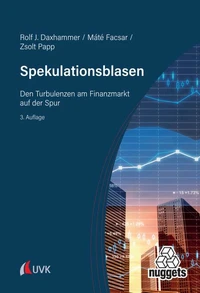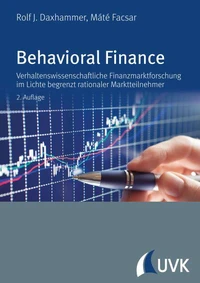Behavioral Finance. Limited Rationality in Financial Markets
Par : , ,Formats :
Disponible dans votre compte client Decitre ou Furet du Nord dès validation de votre commande. Le format ePub est :
- Compatible avec une lecture sur My Vivlio (smartphone, tablette, ordinateur)
- Compatible avec une lecture sur liseuses Vivlio
- Pour les liseuses autres que Vivlio, vous devez utiliser le logiciel Adobe Digital Edition. Non compatible avec la lecture sur les liseuses Kindle, Remarkable et Sony
 , qui est-ce ?
, qui est-ce ?Notre partenaire de plateforme de lecture numérique où vous retrouverez l'ensemble de vos ebooks gratuitement
Pour en savoir plus sur nos ebooks, consultez notre aide en ligne ici
- Nombre de pages402
- FormatePub
- ISBN978-3-7398-0586-3
- EAN9783739805863
- Date de parution30/01/2023
- Protection num.Digital Watermarking
- Taille9 Mo
- Infos supplémentairesepub
- ÉditeurUVK Verlagsgesellschaft mbH
Résumé
Over the last 50 years, neoclassical financial theory has been dominating our perception of what is happening in financial markets. It has spurred numerous valuable theories and concepts all based on the concept of Homo Economicus, the strictly rational economic man. However, humans do not always act in a strictly rational manner.
For students and practitioners alike, our book aims at opening the door to another perspective on financial markets: a behavioral perspective based on a Homo Oeconomicus Humanus.
This agent acts with limited rationality when making decisions. He/she uses heuristics and shortcuts and is prone to the influence of emotions. This sounds familiar in real life and can be transferred to what happens in financial markets, too.
This agent acts with limited rationality when making decisions. He/she uses heuristics and shortcuts and is prone to the influence of emotions. This sounds familiar in real life and can be transferred to what happens in financial markets, too.
Over the last 50 years, neoclassical financial theory has been dominating our perception of what is happening in financial markets. It has spurred numerous valuable theories and concepts all based on the concept of Homo Economicus, the strictly rational economic man. However, humans do not always act in a strictly rational manner.
For students and practitioners alike, our book aims at opening the door to another perspective on financial markets: a behavioral perspective based on a Homo Oeconomicus Humanus.
This agent acts with limited rationality when making decisions. He/she uses heuristics and shortcuts and is prone to the influence of emotions. This sounds familiar in real life and can be transferred to what happens in financial markets, too.
This agent acts with limited rationality when making decisions. He/she uses heuristics and shortcuts and is prone to the influence of emotions. This sounds familiar in real life and can be transferred to what happens in financial markets, too.






